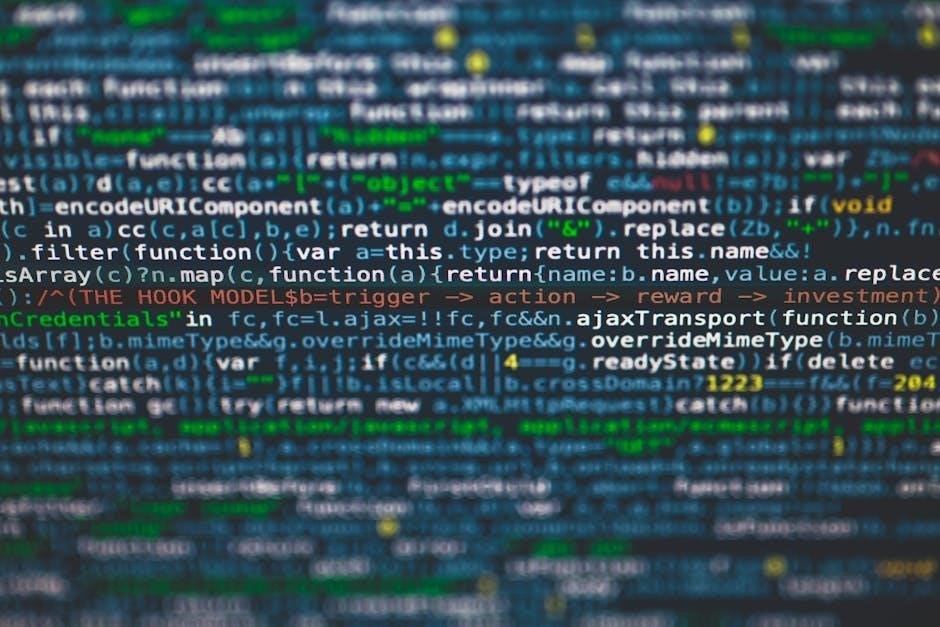Calculus of a single variable explores functions of one variable, focusing on limits, derivatives, and integrals. It forms the foundation of mathematical analysis and its applications.

Definition and Scope
Calculus of a single variable is a branch of mathematics that studies functions of one variable, focusing on concepts like limits, continuity, and infinite series. It encompasses differential calculus, which examines rates of change and slopes of curves, and integral calculus, which deals with accumulation and areas under curves. The scope extends to solving real-world problems in physics, engineering, and economics. Key elements include optimization, related rates, and the Fundamental Theorem of Calculus, linking differentiation and integration. This field provides tools for modeling change and understanding complex phenomena, making it foundational for advanced mathematics and scientific applications.
Importance in Mathematics and Science

Calculus of a single variable is fundamental in mathematics and science, providing tools to analyze change and accumulation. It underpins physics, engineering, and economics, enabling the study of rates of change, optimization, and complex systems. Derivatives and integrals are essential for modeling real-world phenomena, such as motion, heat transfer, and population growth. The concepts of limits and continuity form the backbone of mathematical analysis, while differential and integral calculus solve practical problems. Its applications extend to wave equations and heat equations, demonstrating its versatility in solving intricate scientific challenges. As a core discipline, single-variable calculus fosters problem-solving and critical thinking, making it indispensable in modern STEM education and research.
Key Concepts in Single Variable Calculus
Single variable calculus focuses on limits, continuity, derivatives, and integrals, providing tools to analyze rates of change and accumulation in functions of one variable.
Limits and Continuity
Limits are fundamental in calculus, defining the behavior of functions as inputs approach specific values. They determine the value a function approaches, irrespective of its definition at the point. Continuity ensures functions have no breaks, jumps, or holes, with the limit matching the function’s value at the point. The formal epsilon-delta definition provides precision, while theorems like the Squeeze and Intermediate Value Theorems aid in evaluating limits and continuity. Understanding these concepts is crucial for differential calculus, as they establish how functions behave and enable operations like differentiation and integration. They form the groundwork for analyzing rates of change and solving real-world problems in mathematics and science.
Differential Calculus
Differential calculus focuses on the study of rates of change and slopes of functions. It introduces the concept of the derivative, which measures how a function changes as its input changes. This branch of calculus is fundamental for understanding motion, optimization, and rates of growth in various fields. The derivative is defined as the limit of the difference quotient and is computed using rules such as the power rule, product rule, and quotient rule. Applications of differential calculus include finding maximum and minimum values of functions, determining velocity and acceleration in physics, and analyzing economic models. PDF resources like Active Calculus 2018 and Calculus: Single Variable provide detailed explanations and exercises to master these concepts. Understanding derivatives is essential for progressing in higher-level mathematics and science.
Integral Calculus
Integral calculus focuses on the concept of integration, which calculates the area under curves and accumulates quantities. It introduces definite and indefinite integrals, with the Fundamental Theorem of Calculus linking integration and differentiation. Applications include solving real-world problems, such as optimizing functions and modeling physical phenomena. The theory extends to techniques like substitution, integration by parts, and partial fractions. Resources like Active Calculus 2018 and Calculus: Single Variable by Laura Taalman and Peter Kohn provide comprehensive guides. MIT OpenCourseWare offers free lecture notes and materials, while Reddit communities share PDF versions of textbooks. These tools help students master integral calculus, essential for advanced mathematics and science.

Textbooks and Resources
Active Calculus 2018, Calculus: Single Variable by Laura Taalman, and MIT OpenCourseWare are top resources, offering comprehensive PDFs and lecture materials for single variable calculus studies.
Active Calculus 2018: PDF and Print Versions
Active Calculus 2018 offers comprehensive resources for single variable calculus in both PDF and print formats. The PDF version is widely available for download, providing easy access to the material. This textbook, authored by Laura Taalman and Peter Kohn, covers essential topics like limits, derivatives, and integrals. It is designed to engage students with interactive exercises and clear explanations. The print version is also accessible for those who prefer physical copies. Active Calculus 2018 is part of a series that includes both single and multivariable calculus, making it a versatile resource for learners. Its availability in multiple formats ensures flexibility for different learning preferences. This resource is highly recommended for students seeking a thorough understanding of single variable calculus.
Calculus: Single Variable by Laura Taalman and Peter Kohn
This textbook, co-authored by Laura Taalman and Peter Kohn, is a popular resource for learning single-variable calculus. It provides a comprehensive introduction to the subject, covering essential topics such as limits, derivatives, and integrals. The book is known for its clear explanations and practical examples, making it accessible to students at various skill levels. While primarily available in print, discussions on platforms like Reddit suggest that PDF versions are sought after by many learners. However, it is important to ensure that any digital copies are obtained through legal and ethical means, such as official publisher websites or authorized educational platforms.
MIT OpenCourseWare: Lecture Notes and Materials
MIT OpenCourseWare offers comprehensive lecture notes and materials for single variable calculus, covering essential topics such as limits, differentiation, and integration. The resources include detailed notes, problem sets, and solutions, providing a structured approach to learning. Video lectures are also available, enhancing understanding through visual and auditory explanations. These materials are freely accessible online, making high-quality education available to everyone. They are particularly useful for students seeking supplementary resources or those pursuing self-study. The notes are well-organized, ensuring a logical progression through the subject matter, and are accompanied by additional resources to aid in mastering calculus concepts.

Online Learning and PDF Availability
Single variable calculus resources are widely available online, with free PDF downloads, lecture notes, and textbooks accessible through platforms like MIT OpenCourseWare and Reddit communities.
Free PDF Downloads and Availability
Various resources offer free PDF downloads for single-variable calculus materials. Active Calculus 2018 provides PDF and print versions, available for both single and multivariable calculus. Additionally, platforms like Internet Archive host free downloads of calculus textbooks, such as Ron Larson’s Calculus of a Single Variable. Reddit communities, like r/UTSC, often share PDF links for textbooks by authors like Laura Taalman and Peter Kohn. Many universities, including MIT, offer open-course materials, including lecture notes and problem sets. These resources are invaluable for students seeking affordable access to high-quality educational content. Ensure to respect copyright laws and use these materials responsibly for academic purposes.
Reddit and Online Communities for Resources
Online communities like Reddit offer valuable resources for studying calculus of a single variable. Users often share PDFs of textbooks, lecture notes, and study materials. For instance, threads on subreddits like r/UTSC have discussions about accessing PDF versions of popular calculus textbooks, such as Calculus: Single Variable by Laura Taalman and Peter Kohn. Additionally, platforms like r/math and r/learnmath provide forums where students can request or share resources, including PDFs of lecture notes and practice problems. These communities not only facilitate access to study materials but also foster collaboration and support among learners. However, it is important to ensure that shared materials are used ethically and in accordance with copyright guidelines.

Applications of Single Variable Calculus
Single variable calculus solves real-world problems in physics, engineering, and economics. It models phenomena like the wave equation and heat equation, essential in advanced scientific analyses.
Real-World Problems and Solutions
Calculus of a single variable is instrumental in solving real-world problems across various disciplines. In physics, it models motion and forces, while in engineering, it optimizes systems and structures. Economics utilizes calculus to analyze supply-demand dynamics and forecasts. Medical fields apply it to understand rates of disease spread and drug absorption. Problems like the wave equation and heat equation are solved using calculus, essential in acoustics and thermodynamics. Textbooks such as Active Calculus 2018 and resources from MIT OpenCourseWare provide practical examples, demonstrating how calculus tackles challenges in physics, biology, and economics. These applications highlight calculus’s versatility and importance in addressing complex, real-world scenarios effectively.
Wave Equation and Heat Equation Applications
Single-variable calculus plays a crucial role in understanding the wave equation and heat equation, which describe how disturbances and heat propagate over time. The wave equation models vibrations, while the heat equation governs diffusion. Both rely on partial derivatives, though their foundations in single-variable calculus, such as limits and continuity, are essential. For example, the heat equation in one spatial variable simplifies analysis, enabling solutions using basic integral calculus. Similarly, wave phenomena in one dimension are analyzed using derivatives, showcasing the practicality of single-variable calculus in physics. These applications are explored in resources like Active Calculus 2018 and MIT OpenCourseWare materials, providing a bridge between theory and real-world problems.
Calculus of a single variable is foundational, offering insights into change and accumulation. With abundant PDF resources and online materials, mastering it is more accessible than ever.
Future of Learning Single Variable Calculus
The future of learning single variable calculus is evolving with digital resources and interactive tools. PDFs and online materials, like those from Active Calculus and MIT OpenCourseWare, are becoming more accessible, enabling self-paced learning. Platforms like Reddit and specialized forums are fostering collaboration among students. Video lectures and multimedia content are enhancing traditional textbooks, making complex concepts more engaging. The integration of AI and gamification in educational software is expected to revolutionize how calculus is taught and learned. As technology advances, the focus will shift to adaptive learning systems that cater to individual student needs. These innovations ensure that single variable calculus remains accessible and dynamic for future generations of learners.
Final Thoughts on the Topic
Calculus of a single variable is a cornerstone of modern mathematics, offering insights into change and accumulation. Its principles, such as limits, derivatives, and integrals, are essential for solving real-world problems in physics, engineering, and economics. The availability of resources like Active Calculus 2018 and Calculus: Single Variable by Laura Taalman and Peter Kohn ensures accessibility for learners. Online platforms like MIT OpenCourseWare and Reddit communities further support education. As technology advances, learning calculus is becoming more interactive and personalized. Despite its challenges, mastering single variable calculus opens doors to deeper mathematical understanding and practical applications. Continuous practice and exploration of its concepts will remain vital for future innovations.
